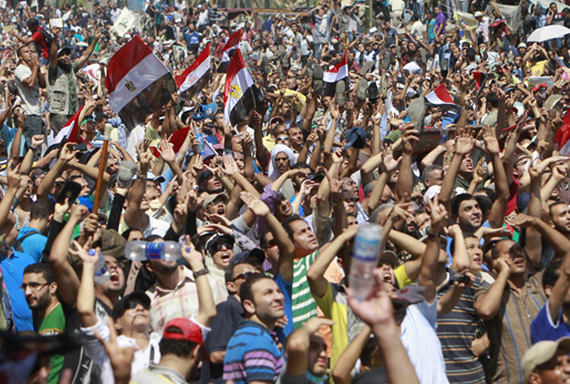
Cairo, Aug 17: Gunfire was on Saturday heard at a Cairo mosque where hundreds of supporters of deposed Egyptian President Mohamed Morsy were engaged in a tense standoff with security forces, even as the death toll in fierce street clashes rose to nearly 180.
Gunshots were heard at Al-Fatah mosque near Ramses Square in central Cairo, where security forces in riot gear have surrounded pro-Morsy supporters.
State-run MENA news agency reported that gunmen were firing from inside the mosque and live footage on television showed security forces shooting at a minaret from outside.
Scores of protesters, who took those killed and wounded in Friday’s clashes to the mosque, have refused to leave.
Some security personnel entered the mosque to negotiate with protesters and reportedly offered to allow women to leave the mosque but said men would be held for questioning. The Muslim Brotherhood rejected the proposal.
Speaking to Al Jazeera by phone from inside the mosque, Omaima Halawa said there were about 700 people, including women and children, inside.
They feared leaving the mosque because “there were thugs outside with the security forces, and that... the security forces were working with the thugs”, she said.
Egypt’s Nile News reported that about 10 people, mostly women, left the mosque with the body of a woman who died on Friday.
As the toll in Friday’s clashes between protesters and security forces across the country rose to 173, the Muslim Brotherhood on Saturday called for a week of protests.
Brotherhood spiritual leader’s son killed
Senior Muslim Brotherhood leader Mohamed Badie’s son was among dozens shot dead in the Egyptian capital on Friday.
Ammar Badie, a 38-year-old computer engineer, died of a bullet wound in Ramses Square in Cairo during protests.
The Muslim Brotherhood has established a makeshift field hospital in the mosque at Ramses Square, the latest flashpoint in a growing crisis.
Two protesters inside the mosque told BBC they did not trust the authorities’ promises of a safe exit. They said the protesters had drinking water but there was only one toilet.
Security officials quoted by MENA news agency claimed “armed elements” had opened fire from inside the mosque. They said people were being prevented from leaving the mosque by protesters.
Mr. Morsy’s supporters took to the streets after Friday prayers to protest the killing of over 600 in the August 14, 2013 crackdown by the military-backed government.
Egypt’s interim officials say more than 1,000 Islamists were arrested after Friday’s protests, dubbed as “Day of Rage“.
“The number of Muslim Brotherhood elements arrested reached 1,004,” the Interior Ministry said in a statement.
“Our rejection of the coup regime has become an Islamic, national and ethical obligation that we can never abandon,” said the Brotherhood, which has accused Egypt’s military of plotting the downfall of Mr. Morsy last month to regain the levers of power.
The crackdown has divided Egyptians as never before in recent history, splintering the army-installed government and inviting international censure.
An interim cabinet, installed by the Army after it removed Morsy during rallies against his rule, has refused to back down in the face of the protests. It has authorised police to use live ammunition to defend themselves and state installations.
Bader Abdel Atty, a spokesman for the Egyptian Foreign Ministry, defended the actions of the security forces in an interview with Al Jazeera, saying that protesters were armed with machine guns.
He dismissed international condemnation of the violence and said Egypt would accept no external interference.
Egypt’s interim leaders have imposed a state of emergency with dusk-to-dawn curfews in the capital and other areas. The Interior Ministry says police have been authorised to use live ammunition “within a legal framework“.
The Muslim Brotherhood has been on the streets since July 3 after the army deposed Mr. Morsy — Egypt’s first democratically elected president — last month and installed an interim government.
Al-Qaeda chief’s brother held
Authorities have also arrested the brother of al-Qaeda chief Ayman al-Zawahiri, a security official was quoted by media reports as saying.
Mohammed al-Zawahiri, leader of the ultraconservative Jihadi Salafist group, was detained at a checkpoint in Giza.





Comments
Add new comment